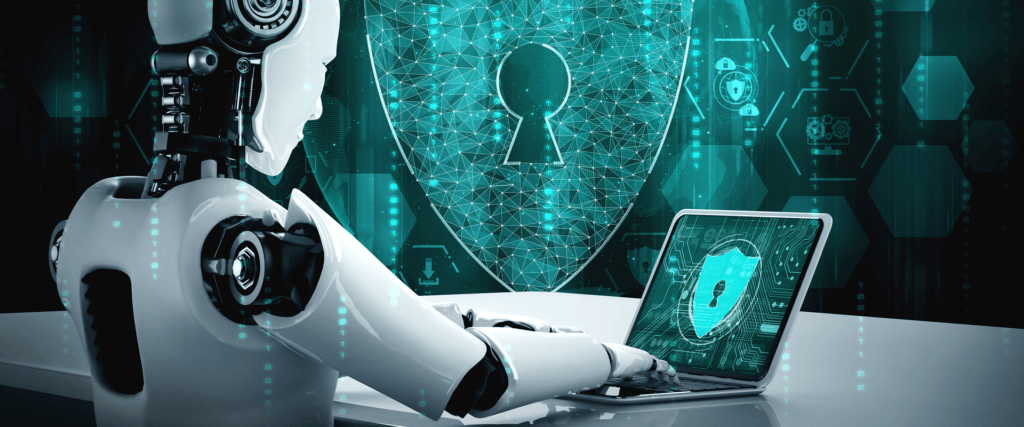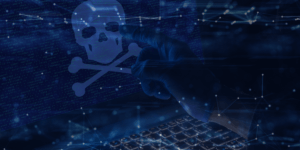Artificial intelligence (AI) has taken the digital world by storm. From chatbots and personalised content creation (such as ChatGPT) to facial recognition and robotics, artificial intelligence is everywhere.
It’s likely that you encounter AI in ways you don’t even realise, like when you say “Siri, play music”. But what exactly is AI and how does it affect cyber security?
In this blog, we’ll break down the benefits and drawbacks of AI when it comes to cyber security, so that you can always stay best prepared and protected.
Firstly, what is artificial intelligence?
As a complex topic that most people struggle to wrap their heads around, many will bury their heads in the sand rather than deal with it head on. But this is the wrong decision.
AI is simply a machine’s ability to mimic and perform a human’s cognitive functions. These include learning, reasoning, perceiving, problem solving and interacting, as well as even practising creativity.
This means AI can learn and produce brilliant technical advancements, aiding the human experience. However, along with the benefits come many challenges, especially in regards to cyber security.
Of course, AI developments have come on tenfold in recent years, so research into the benefits and drawbacks is likely to change over time as we see more results. But as of now, here are the main topics of conversation and concern.
Benefits of AI in cyber security
Identifying potential threats
AI has the capability to analyse patterns in network traffic data, so it can identify potential threats early on and alert cyber security professionals of a possible breach. This is a brilliant advancement for cyber security professionals, truly aiding and streamlining processes.
By analysing a large amount of data, it can also pick out threats that humans may not have been able to identify. A computer is unlikely to miss inconsistencies, while human error is inevitable and understandable.
Saving time
There are some tasks that AI can take off of security professionals’ hands. For example, by using AI to automatically patch and update systems, security professionals can spend time on other, more complicated tasks that require human attention.
The speed in which they can detect cyber threats is also a time saver in that it can help to intercept a breach faster than ever.
Making informed decisions
The need to make informed decisions is crucial in cyber security, as the wrong decision can have massive consequences. Using AI to generate reports, alerts and data sheets enables cyber security professionals to make decisions based on evidence and fact.
Not only does this benefit the cyber security professional, but also the customer they are helping to protect.
Drawbacks of AI
Cyber criminals
As one of the main drawbacks of AI, cyber criminals are harnessing AI to strengthen their abilities, making their threats more sophisticated and harder to avoid.
Artificial intelligence is being used to build more believable phishing emails, create deepfake videos or audio, and deploy malware. On top of this, it’s helping to do it faster than ever before, meaning more people are able to be targeted.
As this technology develops, as will the cyber criminals’ techniques. Advanced technology allows criminals to find more creative and elaborate ways to hack, meaning people need to be prepared for upcoming attacks by educating themselves and others on phishing, malware and deepfake.
Lack of human oversight
As mentioned previously, there are some tasks in cyber security that machine learning can accomplish without the need for human interaction. However, this certainly is not the case for the majority of tasks.
It is essential that humans are still involved in the decision making process, especially in areas where automation is not possible or recommended, such as high-stakes or how to respond to certain threats.
Also, it’s worth noting that AI can be incorrect. Just because it is continuously learning from the endless pool of information found online, that does not mean it is always factually correct. You only need to search the web to discover the vast amount of false information. This means that human oversight is needed to correct any mistakes, as mistakes can have a disastrous effect on business.
Bias
Humans are biassed, this we know. Therefore, if an artificial intelligence system is trained on biassed or incomplete data, it is likely to also develop a bias. The problem with this is that the AI can then become problematic and make decisions that should not be made, such as discriminatory decisions or allowing for false identification.
You can’t avoid AI, but you can protect yourself
No matter your thoughts on the development and deployment of artificial intelligence, it is unavoidable. For any business – including cyber security businesses – coming face-to-face with the negative challenges of AI is inevitable.
That’s why being prepared is so crucial.
If you’re going to be attacked by AI whether you like it or not, the best way to defend yourself is by preparing in advance. After all, once it’s too late, it’s too late. It’s better to be prepared than to have to deal with the damage of a catastrophic cyber attack.
Be prepared with SupPortal
At SupPortal, we work with businesses to prioritise their cyber safety.
Whether it’s a security breach from cyber criminals, viruses, malware or even an accidental employee breach, we can help. We provide a range of CSaaS solutions including Managed Cyber Security subscriptions, Cyber Security Assessments, Cyber Security Awareness Training, Cyber Incident Response and Disaster Recovery and by helping achieve Cyber Essentials certification.
If you’d like to implement protection against cyber crime, or talk further about the importance of understanding the threats of AI, chat to us at 02380982218.




